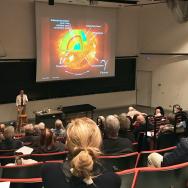The concept of symmetry is rooted in daily life, apparent in the butterflies that migrate each spring, the buildings where we work and the music we play. But how did symmetry become so fundamental to our understanding of the universe—and what happens when symmetry is broken?
A series of free public lectures at the University of Chicago will explore the role of symmetry in the development of modern physics, how it has led to a series of experimental searches for particle decay and why a case of asymmetry is one of the world’s biggest unsolved mysteries.
The Arthur Holly Compton Lectures, named for the Nobel Prize-winning physicist who led the historic 1942 UChicago experiment that produced the first nuclear reaction, aim to make the physical sciences accessible to the public. Sponsored by the University’s Enrico Fermi Institute, the eight lectures will begin April 6 and will be held at 11 a.m. Saturdays through June 1 in Room 106 of the Kersten Physics Teaching Center.
Delivering the lectures this spring will be UChicago postdoctoral scholar Yu-Chen Tung. His lectures will begin with the application of symmetry to classical physics and how the concept became integral to modern physics through the development of particle physics. In later lectures, Tung will draw upon his own research in the field of high-energy physics to discuss one of the field's most important questions: Why is the universe made chiefly of matter, when it should consist of equal parts matter and antimatter?
“I hope the audience comes to understand how symmetry can be used to explain so many phenomena in physics—from the laws of conservation to how particles interact,” Tung said.
Tung received his PhD from the National Taiwan University and then worked on E391a, a high-energy physics experiment in Japan. At the University of Chicago, Tung works on a newer iteration of that experiment, called KOTO, which aims to illuminate the matter-antimatter asymmetry by studying the decays of subatomic particles called kaons.
For more information, visit the Compton Lectures site.

